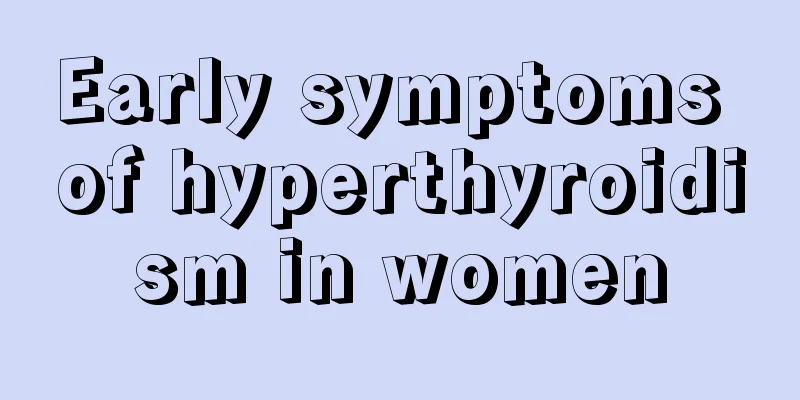Can hyperthyroidism cause irregular menstruation?

|
I believe that many people will encounter the problem of hyperthyroidism in their lives. In fact, hyperthyroidism is not as terrible as everyone imagines. It is just a relatively common disease, but there are many symptoms caused by hyperthyroidism. For example, after the onset of hyperthyroidism, patients usually experience symptoms of irritability, physical fatigue, fear of cold and heat, in addition to this, it is accompanied by irregular menstruation, which leads to infrequent menstruation in women and causes uneven hormones. Can hyperthyroidism cause irregular menstruation? Hyperthyroidism can cause menstrual irregularities, which mainly manifest as infrequent menstruation in women. Hyperthyroidism is mainly due to thyrotoxicosis caused by excessive secretion of thyroid glands and thyroid hormones. In terms of clinical manifestations, the severity of its symptoms and physical signs are related to factors such as the length of medical history, the degree of hormone elevation, and the patient's age. The main symptoms are irritability, restlessness, insomnia, palpitations, fatigue, heat intolerance, sweating, weight loss, increased appetite, increased bowel movements or diarrhea, which may be accompanied by periodic paralysis and progressive weakness and atrophy of proximal muscles. There are two main types of eye manifestations: The first type is simple exophthalmos, the cause of which is related to the increased sympathetic nerve excitability caused by thyrotoxicosis. The other type is infiltrative exophthalmos, the cause of which is mainly related to the inflammatory response of orbital tissue. The manifestations of simple exophthalmos are mainly mild protrusion of the eyeball, widening of the palpebral fissure, and reduced blinking, while the infiltrative exophthalmos is more obvious in terms of eyeball protrusion. Hormones cause menstrual irregularities Hormones do cause menstrual irregularities clinically. The most common ones are due to endocrine diseases, including abnormal thyroid hormone levels, abnormal glucocorticoid levels, and abnormal prolactin levels, all of which can lead to irregular menstruation. To put it simply, when there is hyperprolactinemia, the high level of prolactin in the blood will lead to a series of clinical manifestations related to fertility and menstruation, including amenorrhea, scanty menstruation, unstable menstrual cycle, and no ovulation. Abnormal thyroid hormone levels, for example, in patients with hyperthyroidism or hypothyroidism, in patients with hypothyroidism and hyperthyroidism, if not treated in time and hyperthyroidism and hypothyroidism are not controlled, it may also cause irregular menstruation. Excessive secretion of glucocorticoids is caused by various adrenal diseases, which may also be one of the causes of menstrual disorders. |
<<: Girls are irritable during their menstrual period
>>: Is there any relationship between irregular menstruation and fallopian tubes?
Recommend
Which groups of people are prone to premature birth?
Premature birth is a serious problem. Because pre...
What are the dangers of women staying up late for a long time?
Nowadays, many women stay up late, especially tho...
The 5 foods that women's bodies need most
Any food has its role, but for women, some foods ...
Can I still eat preserved eggs if they are expired? What should I do if the preserved egg white is watery?
Preserved eggs are a delicious cold dish that peo...
I feel weak all over during menstruation
Many people feel weak all over when they have the...
The reason why girls have pale lips
Generally, people with anemia have insufficient b...
How to replenish blood and qi for women in summer
Many women need to replenish blood and nourish qi...
How to regulate the period
How to take care of light menstrual flow? This is...
How to determine whether an ovarian cyst is benign?
When ovarian cysts occur, patients should look fo...
Six months pregnant, swollen feet, gender
Many people believe that swollen feet during preg...
Can I have sex before having a salpingogram?
If a woman is infertile, she needs to go to the h...
Janrain: It is best for the website to provide multiple social login methods
In order to reduce the trouble of user login and ...
Bleeding like menstruation at 6 weeks pregnant
Many pregnant women are afraid of having vaginal ...
Do you have a bad face shape? Maybe you have this bad habit in the past! The earlier you treat it, the less impact it will have.
When looking in the mirror Everyone's face sh...
Is food inedible after it sprouts? This is not necessarily true!
When we see food starting to sprout, our first re...









